Digital Infrastructure for Verifiable Open Credentialing
Digital Infrastructure for Verifiable Open Credentialing
The Digital Infrastructure for Verifiable Open Credentialing (DIVOC) is an open-source platform that enables countries to digitally orchestrate large-scale health campaigns such as vaccination and certification programs. DIVOC is a flexible and extendable software that can be used across multiple health programs. Its scalable and data-driven architecture allows it to deal with diverse country-specific scenarios. In a vaccination program, for example, it gives countries the ability to manage and control vaccines, facilities, and vaccinators systematically across geographies, as well as generate digitally variable certificates that are compliant with international standards. The platform is modular, enabling countries to use the components together or as an individual standalone solution, according to their need, for end-to-end vaccination and certification.
Approach
DIVOC has two core modules:
1. Issue and Verify Certificates: Countries can use this module to issue QR code-based digitally verifiable certificates to the entire population at speed and scale for a registered health event such as vaccination. It can be adapted to other areas too where there is a requirement for secure and tamper-proof documents. Designed for verification in no-to-low internet environments, the certificates can be issued in both digital and physical forms, which includes print, pdf, and other easy-to-access formats. This module can also be used to distribute, update or revoke certificates.
2. Analytics: DIVOC’s analytics dashboard is a performance monitoring dashboard that enables countries to harness data, get powerful insights, and generate customized analytical reports.
Reference Implementation: Other components of DIVOC can be customized by countries according to their requirement -
1. Program Setup: Before any major public health event, this module enables countries to establish and maintain multiple registries for the program, create appointment schedules, set up facilities, enroll recipients, activate/deactivate facilities, and adjust vaccination rates, among others.
2. Facility App: This staff at a facility can use this app to register new beneficiaries when they walk into a facility for on-the-spot registration before an event such as vaccination, capture that information, and manage queues. The facility/system administrator can also verify beneficiaries and print the vaccination certificates at a facility.
3. Citizen Portal: Citizens can use this portal to register themselves, book appointments, download certificates, and report side effects after a health event.
4. Feedback: Countries can configure this module to receive feedback on facilities that are running a health program.
The primary users of DIVOC are Ministries or Departments of Health/Entities/Organizations providing any certifications, citizens, and health professionals.
Implementations
Every fifth person in the world today carries a certificate issued via DIVOC. The platform’s vaccination certificate module went live in India in January 2021 and was subsequently adopted by four more countries: Sri Lanka, the Philippines, Jamaica, and Indonesia. As of July 2022, over 2 billion vaccination certificates have been issued via DIVOC across five countries. The certificates, which are WHO Digital Documentation of COVID-19 Certificates (DDCC) as well as EU-compliant, are accepted in 120 countries. The VC component has seen adoption across all social and economic sections of the society, opening up the prospects of their livelihood.
Resources
- Website: https://divoc.egov.org.in/
- Source Code: https://github.com/egovernments/DIVOC
- Documentation site: https://divoc.digit.org/
- Demo: https://divoc.digit.org/divoc-demo
- Article:
